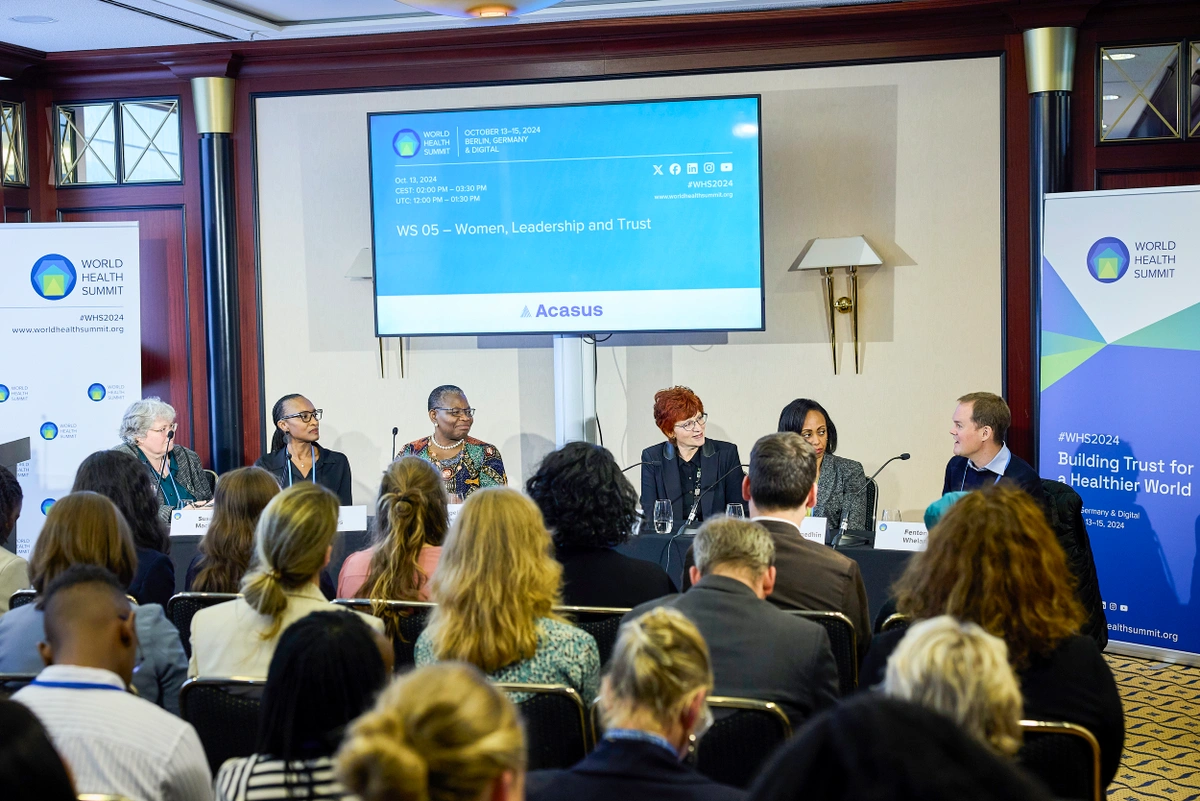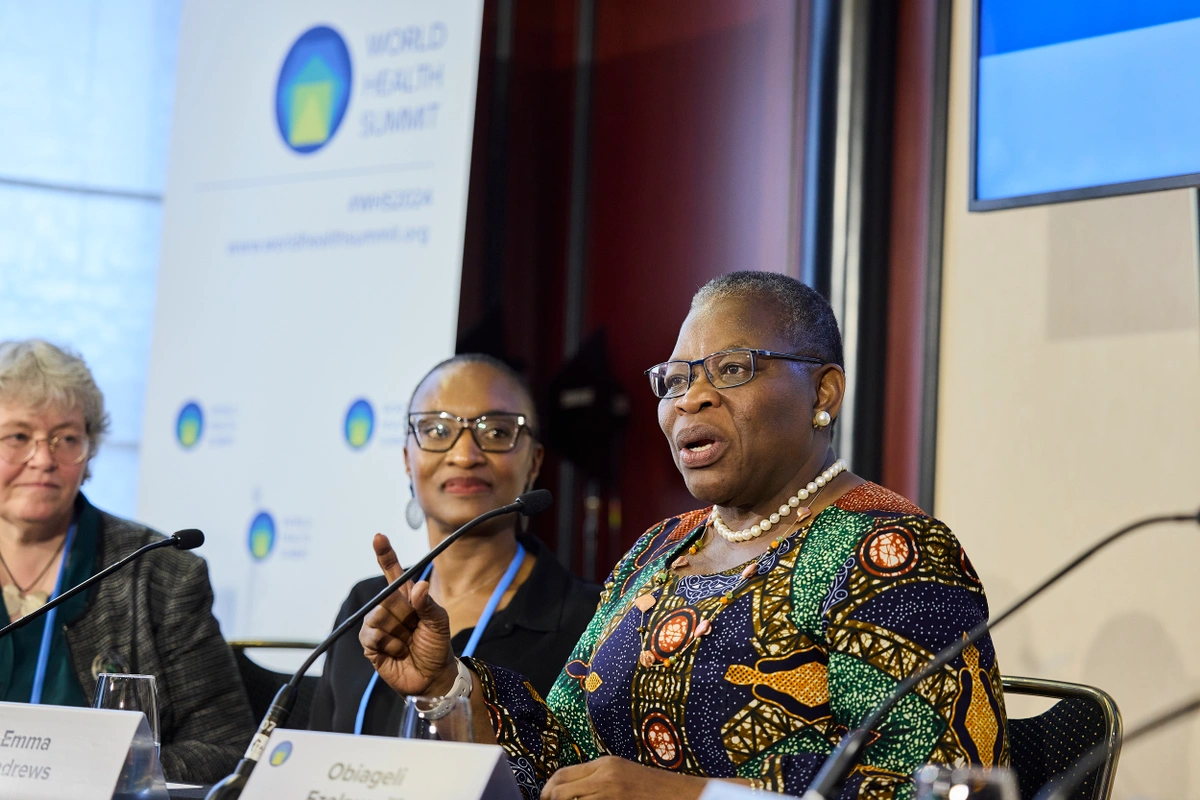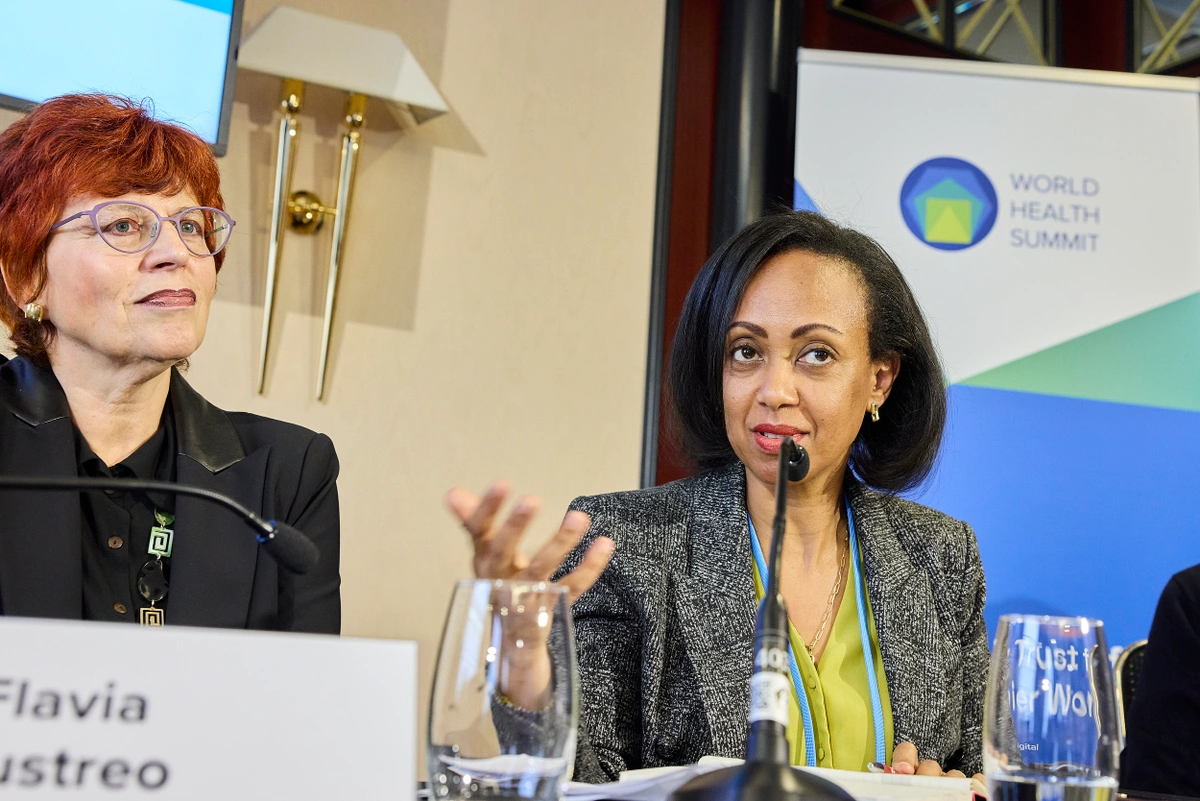
If the past few years have taught us anything, it is that trust is the foundation on which effective health systems are built.
Yet, as Acasus' CEO, Fenton Whelan, emphasised during Acasus' recent panel discussion on Women, Leadership and Trust at the World Health Summit 2024 in Berlin, "How do we expect citizens to trust the health system, when the leadership of that system isn't representative of over half the citizens it's serving?"
Acasus' CEO was joined by four trailblazing female leaders in global health: Dr. Emma Andrews, Vice President of Global Patient Advocacy at Pfizer; Dr. Obiageli "Oby" Ezekwesili, CEO of Human Capital Africa; Dr. Flavia Bustreo, Vice-Chair of Fondation Botnar; and Dr. Lia Tadesse Gebremedhin, Executive Director of the Harvard Ministerial Leadership Program. These leaders have broken down many barriers, but as women, their leadership remains the exception, rather than the norm.
The Representation Gap
Women make up around 70% of the healthcare workforce worldwide, while they are also the primary users of health services. Yet they only occupy approximately 25% of leadership roles globally. Women are indispensable at hospital bedsides, yet the decision-making tables shaping healthcare remain dominated by men. Dr. Bustreo underscored the severity of this imbalance, noting that the WHO has had just 15 years of female leadership throughout its 75-year history. Meanwhile, the United Nations has yet to see its first female Secretary-General.
The gender gap in leadership is not merely an issue of fairness. The absence of women's voices compromises the effectiveness, integrity and sustainability of health systems worldwide. Dr. Oby set the tone for the discussion, stating, "If we continue at the speed we're going, it will take us more than 234 years to close the gap… are we comfortable to allow our great-great-great… granddaughters to come into a world where we're still talking about this? I don't think so."
Deficit of Trust
Research conducted by the WHO shows that the lack of women in public health leadership undermines people's trust in health systems. Moreover, the Harvard Kennedy School has shown that institutions led by women are often perceived as being more trustworthy. This trust often comes from women-led health systems prioritising patient perspectives, which improves health outcomes, patient-provider communication, and continuity of care. It also places greater focus on preventive services. This strengthens trust between health systems and the communities they serve.
When women have led important health initiatives, they have often delivered significant improvements in health outcomes. For example, Dr. Lia is an inspirational leader who brought about these improvements as Ethiopia's Minister of Health during the Covid pandemic.
By prioritising improvements in data tracking systems and using community health workers to check in proactively at the household level, Dr. Lia made it possible to track data on a daily and weekly basis, rather than just on the usual monthly basis. As a result, the country was able to make better use of scarce commodities, while Dr. Lia provided the Prime Minister and cabinet with the data they needed to make more informed decisions. The ability to build coalitions and enhance trust between health systems and communities was crucial here.
Trust Through Representation
Speaking at Acasus' Women, Leadership and Trust discussion at the World Health Summit, Dr. Lia acknowledged that "the barriers [for women in leadership] are multifaceted… There are a lot of structural, but also mindset barriers that can be solved. They are not insurmountable – they just need intentionality and commitment." Dr. Tadesse credits much of her own development to the mentorship of Dr. Tedros Adhanom Ghebreyesus – the current WHO Director-General – who identified her potential and mentored her when he was Ethiopia's Minister of Health.
Dr. Bustreo reiterated the need for intentionality in driving change, stating, "If we want to change the situation, it cannot just be because there is a fantastic woman who breaks through. There have to be some rules of the game."
Elaborating on this statement, Dr. Andrews shared Pfizer's progress in closing the gender gap. She noted, "There's a phrase we love at Pfizer: If it's measured, it gets done." Dr. Andrews then explained how three years prior, Pfizer's CEO set a target for the company to have women making up 47% of its Vice Presidents by 2025. After starting at 33%, Pfizer is now at 44.8%. Additionally, Pfizer's CEO set a target for 32% of these women to be minorities by 2025. After starting at 19%, this has increased to 30.5%. "So again, if it's measured, it gets done", added Dr. Andrews.
In terms of how Pfizer is achieving this gender leadership rebalancing, Dr. Andrews stated that the company is "being very intentional about having coaching and leadership development – not just with mid- or high-level roles – but throughout the organisation."
Towards Solutions and Actions
One of the major goals of the Women, Leadership and Trust session in Berlin was finding solutions to turn words into actions. It is easy to say that there should be gender equality in the health leadership space, but bringing more intentionality to the leadership teams is crucial.
First, there was broad agreement on the need for collective action. This involves setting a global agenda with measurable targets, tracking progress, and ensuring the investment of both human and financial resources to make real change. Global organisations must take responsibility for driving this forwards.
Second, systematic ways to develop and mentor female (and potentially minority) healthcare leaders emerged as a key priority. Dr. Oby suggested establishing a leadership academy dedicated to developing potential, which would pair future leaders with those who have already made the journey. Dr. Tadesse and Dr. Oby both stressed the need for social change by identifying leadership potential and building confidence in girls from a young age, starting within families.
Third, securing a seat at the decision-making table is essential. Achieving gender equality in leadership is not just about representation – it is about ensuring that women have systematic access to development, mentorship, accountability, and leadership opportunities at every step of their career. We can only achieve this outcome if the type of discussion at the World Health Summit moves from breakout with a couple of hundred people, to plenary discussions at global health forums, including at the next World Health Summit in 2025.
By ensuring that women are present and active at decision-making tables, we can begin to close the gap in trust undermining health systems globally. Then can we create health systems that truly serve – and reflect – everyone.
In a moving moment, the final question to the panel came from an audience member named Samira, a young woman from Afghanistan, who asked, "How can we give hope to the next generation of women denied access to education due to conflict?" Samira's presence in the room, engaging with inspiring global leaders in a conversation filled with passion and creative solutions, was itself a powerful symbol of hope.
And the energy in the room suggests that this was more than just a discussion – it was the spark of a movement that must continue, and one that must turn words into meaningful action.
Watch the discussion: Women, Leadership and Trust at the World Health Summit 2024.




